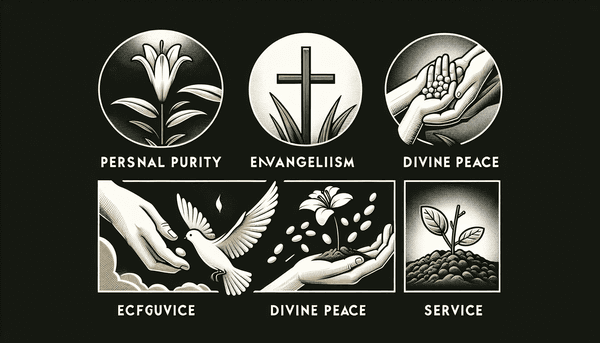The Power of Forgiveness and Reconciliation: Jacob and Esau
The saga of Jacob and Esau is a poignant tale of conflict, estrangement, and eventual reconciliation. The strife between the two brothers, sparked by a deceit over birthright and blessing, serves as a backdrop for a transformative journey. Jacob, having wronged his brother, flees for his life, driven by fear and regret. Years later, when God instructs Jacob to return to his homeland, he must face the brother he betrayed. In a profound display of humility, Jacob sends gifts ahead and prays for deliverance, acknowledging his unworthiness and seeking God's mercy (Genesis 32:9-11). The moment of truth arrives, not with vengeance, but with an unexpected embrace as Esau runs to meet Jacob, forgiving him and weeping on his neck (Genesis 33:4). This narrative vividly illustrates the transformative power of forgiveness and the potential to heal even the deepest of wounds when we approach one another with genuine repentance and grace.
The Message of Jesus in Matthew Chapters 1-12
The opening chapters of the Gospel of Matthew set the stage for the revolutionary message of Jesus. From the genealogy that roots Jesus in history (Matthew 1:1) to the beginning of his ministry proclaiming the kingdom of heaven (Matthew 4:17), these passages introduce a call to a new way of life. Jesus invites us to embrace mercy over sacrifice (Matthew 9:13) and to fulfill the will of the Father as true family (Matthew 12:50). His teachings challenge us to rethink our values and priorities, urging us to live with faith, repentance, and love at the forefront of our actions.
Preaching Themes from Matthew Chapters 1-20
The Gospel of Matthew continues to explore profound themes as Jesus' teachings unfold. Central to his message is the kingdom of God, which calls us to seek divine righteousness above all (Matthew 6:33). Discipleship demands sacrifice, as Jesus urges us to take up our cross and follow him (Matthew 16:24). The power of forgiveness is also a recurring theme, with Jesus teaching the importance of forgiving others so that we, too, may be forgiven (Matthew 6:14-15). These passages remind us that in Jesus' presence, we find the strength to pursue the seemingly impossible (Matthew 19:26), and that our actions as believers should reflect the transformative power of the Gospel.
FAQ
Q: How does the story of Jacob and Esau teach us about reconciliation?
A: Jacob and Esau's story demonstrates that reconciliation is possible with humility, effort to make amends, and openness to forgiveness. It serves as a testament to the power of grace and the healing that can occur in relationships when individuals move beyond their past grievances towards understanding and forgiveness.
Q: What does the Bible say about keeping one's word?
A: The Bible emphasizes the importance of maintaining one's integrity and being truthful in all commitments. In Matthew 5:37, Jesus instructs to let our 'Yes' be 'Yes,' and our 'No,' 'No,' signifying the importance of straightforward communication and keeping promises.
Q: Can the teachings of Matthew 1-12 apply to contemporary life?
A: Yes, the teachings of Jesus in Matthew 1-12, including themes of faith, repentance, and the kingdom of God, are timeless and continue to be relevant for personal transformation and understanding our purpose in contemporary life.
Q: How can the principles from the Bible guide personal growth?
A: Biblical principles such as forgiveness, integrity, faithfulness, and discipleship offer guidance for personal development. They encourage individuals to cultivate strong relationships, live with purpose, and strive for moral excellence.






